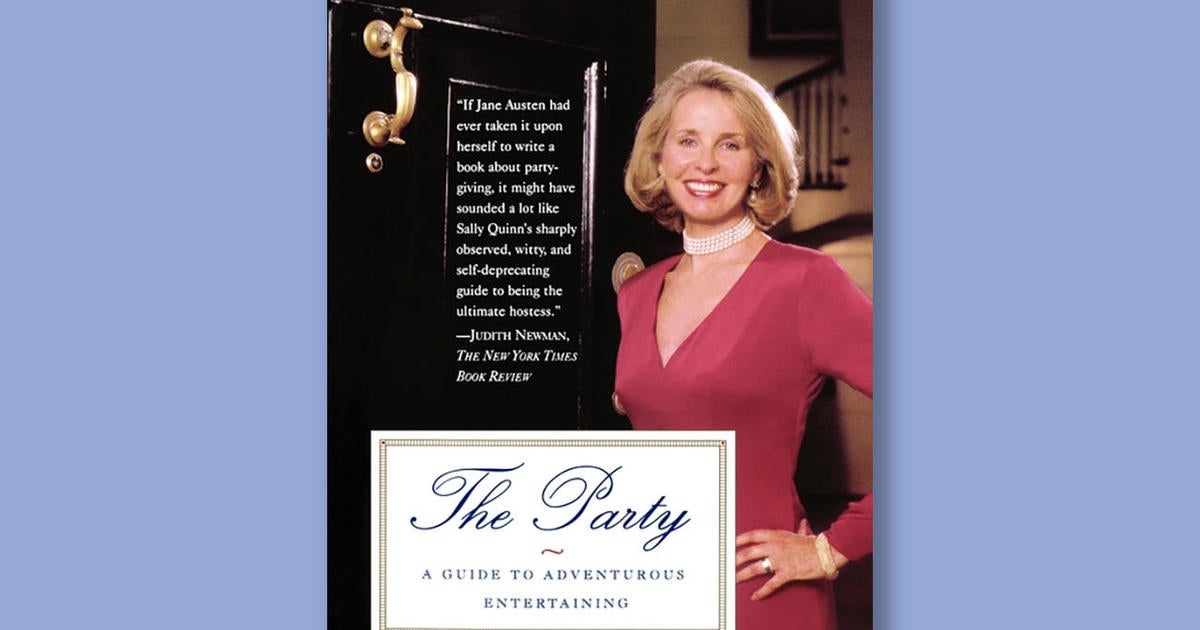
Simon & Schuster
We may receive an affiliate commission from anything you buy from this article.
In the 1940s and ’50s, Washington, D.C. socialite Perle Mesta was renowned for hosting parties that brought political adversaries together. In her 1997 book “The Party: A Guide to Adventurous Entertaining” (Simon & Schuster), Washington Post columnist Sally Quinn writes about the social imperatives for entertaining, and how the role of host and hostess in the nation’s political capital has remained vitally important.
Read an excerpt below, and don’t miss Erin Moriarty’s interview with Sally Quinn on “CBS Sunday Morning” January 19!
“The Party: A Guide to Adventurous Entertaining” by Sally Quinn
Years ago, in the days of legendary Washington hostesses such as Perle Mesta and Gwen Cafritz, playing that role was one of the few ways women of intelligence and ambition could accrue power. Successful hostesses were revered. For these women, entertaining was their life. It was their job.
One of my first jobs in Washington after graduating from college was as social secretary to the Algerian ambassador, Cherif Guellal. It was 1967 when I went to work at the embassy. Washington party giving was in full swing, and the role of hostess was still an admired one. Certainly Cherif, who was a glamorous thirty-two-year-old bachelor, was one of the most celebrated hosts in the city.
Two years later, when I began covering parties for the Washington Post “Style” section, one could already sense the change in atmosphere. It was the late sixties, the Vietnam War was raging, feminism was on the rise, and all of our social values were being questioned in a fundamental way. In that context, parties and hostesses really did not seem appropriate.
Women began rejecting the role of hostess. They went out and joined social movements, got jobs, became activists. They took friends out to restaurants, or simply didn’t entertain at all. It became almost a badge of honor to say, “I never entertain.” The worst, the most dismissive, thing you could have said about another woman, in Washington, at least, was that she was “just a hostess.”
“The Washington hostess” was rapidly becoming extinct.
By the early seventies writer Barbara Howar summed it up: “If I thought my epitaph would read HOSTESS I’d refuse to die.”
She didn’t die, but the Washington hostess did. And nobody mourned her. At first.
Somewhere along the line it became clear that something was missing. The truth was that we had lost one of the most important avenues of social communication and because of that, things just weren’t as much fun anymore.
* * * *
Ten years ago I would never have allowed myself to be persuaded to go on Good Morning America to discuss holiday entertaining. It would have been too humiliating. We were still all locked into the notion that women should be involved only in “serious” ventures.
And yet, and yet … entertaining today is a multibillion-dollar industry in this country, not to mention around the world. Women, and men too, in many professions must entertain as part of their careers. The idea that it was demeaning to “receive or entertain guests” in one’s home seemed to lose credence.
The President and the First Lady (our country’s First Host and Hostess) routinely entertain around forty thousand guests in the White House just in the few weeks before Christmas. And in the first four years of their administration, the Clintons spent over $3.5 million on parties. That’s political entertaining.
One of the main roles of ambassadors is entertaining. That’s diplomatic. Major corporations all over the world have huge expense accounts and entertainment allowances. That’s commercial. And American taxpayers even subsidize individuals and companies by allowing tax deductions for entertaining business associates.
There is nothing frivolous, shallow, or irrelevant about entertaining when you’re talking about that kind of money, energy, time, and commitment, which both men and women, professionally and privately, expend for mere parties.
And never mind the big money; think about your five-year-old’s birthday party. What about the hamburgers and hot dogs, potato salad and baked beans you served at the Fourth of July barbecue or the tea party for your grandmother’s ninetieth birthday? That’s entertaining.
Imagine Bedouins in their tents serving lamb to a visitor, Eskimos producing fish for some explorers, an Amazonian tribe welcoming tourists with a special drink. That’s it, too.
We all do it. Everyone entertains someone sometimes. It’s part of social life. So if you’re going to do it, you might as well do it right.
How do you do it right?
Just follow the Golden Rule. “Do unto others…” Treat your guests the way you would like to be treated. It’s as simple as that.
Excerpt from “The Party: A Guide to Adventurous Entertaining” by Sally Quinn. Copyright © 1997 by Sally Quinn. Reprinted by permission of Simon & Schuster, Inc. All Rights Reserved.
Get the book here:
“The Party: A Guide to Adventurous Entertaining” by Sally Quinn
Buy locally from Bookshop.org
For more info:
-
“The Party: A Guide to Adventurous Entertaining” by Sally Quinn (Simoon & Schuster), in Trade Paperback format









